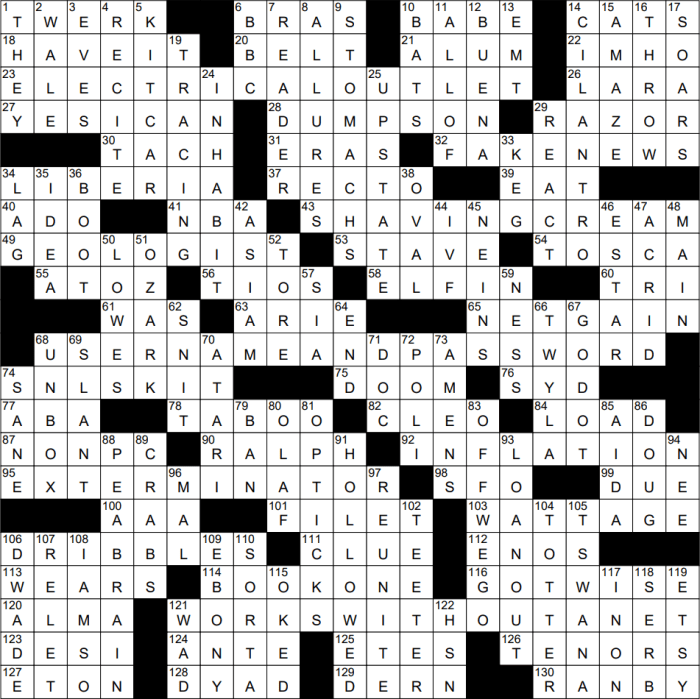Type of work crossword clue embarks on an intriguing exploration of the multifaceted world of employment, unraveling the diverse categories, environments, and intricacies that shape our working lives. From the mundane to the extraordinary, this comprehensive guide illuminates the myriad aspects of work, offering a fresh perspective on this fundamental aspect of human existence.
Unveiling the complexities of work environments, we delve into the contrasting advantages and disadvantages of various settings, from the bustling metropolis to the serene countryside. We examine the impact of work schedules on our well-being, exploring the benefits and drawbacks of flexible arrangements, shift work, and traditional nine-to-five routines.
Types of Work Defined

Work encompasses a diverse range of activities performed for compensation, ranging from traditional employment to freelance endeavors. Each type of work offers unique benefits and challenges.
Let’s explore the various categories of work and employment:
Full-time Employment
Full-time employment involves working a regular number of hours per week (typically 35-40 hours) for a single employer. This type of work often provides a stable income, benefits such as health insurance and paid time off, and opportunities for career advancement.
Part-time Employment, Type of work crossword clue
Part-time employment involves working fewer hours per week (usually less than 35 hours) for a single employer. This type of work offers flexibility, allowing individuals to balance work with other commitments such as education or family responsibilities.
Contract Work
Contract work involves working on a specific project or task for a defined period. Contractors are typically self-employed and work independently, setting their own hours and rates.
Freelance Work
Freelance work involves providing services on a project-by-project basis. Freelancers are self-employed and work with multiple clients simultaneously.
Self-employment
Self-employment involves owning and operating one’s own business. Self-employed individuals have complete control over their work, but they also assume all the risks and responsibilities of running a business.
Temporary Work
Temporary work involves working for a short period (typically less than a year) to fill in for an absent employee or to complete a specific project. This type of work offers flexibility and can provide valuable experience.
Work Environments
The work environment plays a crucial role in shaping employee productivity, job satisfaction, and overall well-being. Different work environments offer unique advantages and disadvantages, and understanding these variations is essential for both employees and employers.
Office Environment
An office environment is a traditional workplace setting characterized by cubicles, desks, and shared office spaces. It typically provides a structured and professional atmosphere, with access to necessary resources and equipment.
Advantages:
- Professional atmosphere:Conducive to formal meetings, presentations, and client interactions.
- Collaboration and teamwork:Close proximity to colleagues fosters communication and idea sharing.
- Access to resources:Printers, copiers, meeting rooms, and IT support are readily available.
Disadvantages:
- Limited flexibility:Fixed work hours and desk assignments can restrict work-life balance.
- Noise and distractions:Open office spaces can be noisy and distracting, impacting concentration.
- Lack of privacy:Cubicles and shared spaces offer limited privacy for confidential conversations or focused work.
Work Schedules

Work schedules are the organized frameworks that establish the hours, days, and patterns of work for employees. They define the time commitments and availability expectations for the workforce, ensuring efficient operations and work-life balance.
There are various types of work schedules, each with its unique characteristics, benefits, and drawbacks. The choice of work schedule depends on factors such as industry, business needs, employee preferences, and legal regulations.
Fixed Schedule
A fixed schedule is a traditional work arrangement where employees work a set number of hours each day, typically from Monday to Friday. This schedule provides stability and predictability, allowing employees to plan their personal lives and commitments accordingly.
Benefits:
- Predictable work hours for planning and childcare arrangements.
- Established routines and clear expectations for work-life balance.
Drawbacks:
- Limited flexibility for employees with other commitments or responsibilities.
- Potential for overtime work during peak periods or deadlines.
Flexible Schedule
A flexible schedule allows employees to adjust their work hours within a defined range. This type of schedule provides greater flexibility for employees to manage their work-life balance, accommodate personal appointments, or attend to family responsibilities.
Benefits:
- Increased flexibility and autonomy for employees.
- Improved work-life balance and reduced stress levels.
Drawbacks:
- Potential for overwork or burnout if not managed effectively.
- May require additional coordination and communication with colleagues and supervisors.
Shift Work
Shift work involves working outside of traditional business hours, such as evenings, nights, or weekends. This schedule is common in industries that operate 24/7, such as healthcare, manufacturing, and retail.
Benefits:
- Increased availability for customers or clients.
- Potential for higher earnings due to overtime pay or shift differentials.
Drawbacks:
- Disruption to sleep-wake cycles and circadian rhythms.
- Social isolation and difficulty maintaining personal relationships.
Compressed Workweek
A compressed workweek involves working a full week’s hours in fewer days, typically four or three days. This schedule provides employees with extended weekends and more free time for personal activities.
Benefits:
- Longer weekends and increased leisure time.
- Improved work-life balance and reduced stress levels.
Drawbacks:
- Longer workdays and potential for fatigue.
- May not be suitable for all industries or job functions.
Remote Work
Remote work allows employees to perform their job duties from a location other than the traditional office setting, such as home, a coworking space, or a coffee shop. This schedule provides flexibility and autonomy for employees.
Benefits:
- Increased flexibility and work-life balance.
- Reduced commuting time and expenses.
Drawbacks:
- Potential for isolation and lack of social interaction.
- Difficulty in maintaining clear boundaries between work and personal life.
Work Relationships

Work relationships are the connections and interactions between individuals within a professional setting. These relationships can have a significant impact on job satisfaction, productivity, and overall workplace culture.
If you’re struggling with a crossword clue about different types of work, don’t despair! Check out our comprehensive guide to kids of the 70’s crossword , where you’ll find all the answers you need. From blue-collar jobs to white-collar professions, we’ve got you covered.
So, whether you’re looking for a clue on a specific type of work or just want to brush up on your general knowledge, be sure to give our guide a read.
There are various types of work relationships, including:
- Supervisor-subordinate relationships:These relationships involve a hierarchical structure, with one person having authority over the other. It is important for both parties to maintain clear communication, expectations, and respect.
- Peer relationships:These relationships involve individuals at the same level within an organization. They often involve collaboration, support, and friendship.
- Cross-functional relationships:These relationships involve individuals from different departments or teams who work together on projects or initiatives. Effective cross-functional relationships require open communication, flexibility, and a willingness to share knowledge.
- Customer relationships:These relationships involve interactions between employees and customers. Building positive customer relationships is crucial for businesses to succeed.
Maintaining positive work relationships is essential for creating a healthy and productive work environment. It involves:
- Communication:Open and honest communication is key to building and maintaining positive relationships. It helps prevent misunderstandings, resolve conflicts, and foster trust.
- Respect:Treating others with respect, regardless of their position or background, is essential for building strong relationships. It involves valuing diversity, listening to others’ perspectives, and being empathetic.
- Collaboration:Working together effectively is essential for achieving shared goals. It involves sharing knowledge, supporting each other, and being willing to compromise.
- Conflict resolution:Conflicts are inevitable in any workplace. It is important to have strategies in place for resolving conflicts constructively, such as active listening, empathy, and finding mutually acceptable solutions.
Work Culture

Work culture refers to the shared values, beliefs, and norms that shape the work environment of an organization. It encompasses aspects such as communication styles, decision-making processes, and employee behavior. A positive work culture can foster employee engagement, productivity, and satisfaction, while a negative one can lead to low morale, high turnover, and decreased performance.
Different work cultures can vary widely across organizations. Some common examples include:
- Collaborative cultures: These cultures emphasize teamwork, open communication, and shared decision-making.
- Competitive cultures: These cultures promote individual achievement, competition, and performance-based rewards.
- Hierarchical cultures: These cultures have a clear chain of command, with decision-making authority concentrated at the top.
- Innovative cultures: These cultures encourage creativity, risk-taking, and the pursuit of new ideas.
Work Skills: Type Of Work Crossword Clue

In today’s competitive job market, possessing a diverse range of work skills is crucial for success. These skills encompass both hard and soft competencies, enabling individuals to perform effectively in their roles and contribute to organizational objectives.
Developing and maintaining these skills is essential for career advancement, adaptability, and employability. Employers seek candidates who demonstrate proficiency in various work skills, as they enhance productivity, collaboration, and overall workplace efficiency.
Hard Skills
- Technical proficiency in specific software, tools, or machinery
- Specialized knowledge in a particular field or industry
- Analytical and problem-solving abilities
- Data analysis and interpretation skills
- Project management and execution capabilities
Soft Skills
- Communication and interpersonal skills
- Teamwork and collaboration abilities
- Adaptability and flexibility
- Emotional intelligence and empathy
- Time management and organization skills
By investing in the development of these work skills, individuals empower themselves to navigate the evolving workplace landscape, seize opportunities, and excel in their careers.
Work-Life Balance

Work-life balance refers to the ability to maintain a harmonious and fulfilling balance between professional and personal aspects of one’s life. It involves managing time and energy effectively to prevent burnout, enhance well-being, and foster overall life satisfaction.
Achieving work-life balance is crucial for maintaining a healthy and productive lifestyle. It helps reduce stress, improves mental and physical health, strengthens relationships, and enhances overall happiness. However, achieving this balance can be challenging in today’s fast-paced and demanding work environments.
Strategies for Achieving a Healthy Balance
There are several strategies that individuals can employ to achieve a healthy work-life balance. These include:
- Setting Boundaries:Establishing clear boundaries between work and personal time is essential. This involves setting work hours, taking regular breaks, and disconnecting from work outside of designated work hours.
- Prioritizing Tasks:Identifying and prioritizing the most important tasks can help individuals focus their efforts and avoid overwhelming themselves with excessive workload.
- Delegating and Outsourcing:When possible, delegating tasks or outsourcing responsibilities can free up time and reduce workload, allowing for more personal time.
- Flexible Work Arrangements:Exploring flexible work arrangements, such as remote work or flexible hours, can provide individuals with greater control over their schedules and improve work-life balance.
- Technology Management:Setting limits on work-related technology use outside of work hours can prevent constant interruptions and promote a healthier separation between work and personal life.
- Self-Care:Engaging in self-care activities, such as exercise, hobbies, and spending time with loved ones, is crucial for maintaining well-being and preventing burnout.
- Seeking Support:Seeking support from family, friends, or colleagues when needed can help individuals manage workload and achieve a healthier balance.
By implementing these strategies, individuals can enhance their work-life balance and create a more fulfilling and sustainable lifestyle.
FAQs
What is the most common type of work environment?
Office-based environments are the most prevalent, followed by remote and hybrid arrangements.
What are the benefits of flexible work schedules?
Increased work-life balance, reduced stress levels, and improved productivity are some key benefits.
How can I improve my work relationships?
Effective communication, empathy, and a positive attitude are essential for building strong work relationships.
What are the essential work skills in today’s job market?
Technical proficiency, problem-solving abilities, communication skills, and adaptability are highly sought-after skills.